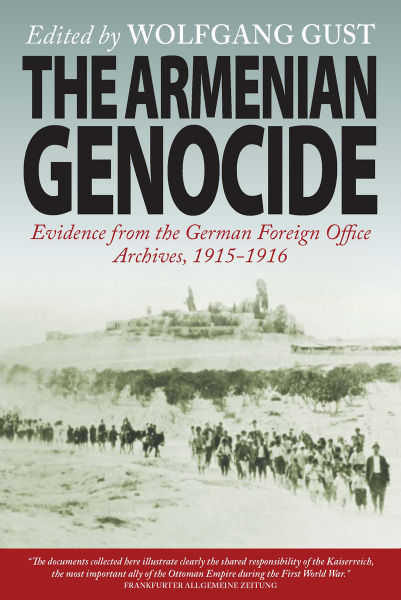English version of Wolfgang Gust’s book “The Armenian Genocide in the Archives of the Ministry of Foreign Affairs of Germany in 1915-16” has been released

Berghahn Books has released the English version of the book “The Armenian Genocide in the Archives of the Ministry of Foreign Affairs of Germany in 1915-16”. The book is edited by Wolfgang Gust. The book includes hundreds of telegrams, letters and reports that German Consuls accredited to the Ottoman Empire have addressed to the Ministry of Foreign Affairs of Germany, providing detailed descriptions of the terrifying episodes of the Armenian Genocide. The documents serve as evidence of the Young Turks’ intentions and go to show the fact that the German government gave its official consent and was an accomplice to the elimination of the Armenian population on the part of the Ottoman Empire.
Those documents are important in that they emphasize the fact that only German military officials could send reports from Turkey without censure during the years of WWI. Besides the Americans, who were neutral prior to 6 April 1917, German diplomats and their informers were the most significant non-Armenian eyewitnesses of the genocide from the representation of the railway of Baghdad or among the employees. The documents designed especially for internal use were not subject to release and stood out with their impartiality. Even as allies of the Ottoman Empire the German officials felt obliged to provide information about the atrocities against the Armenians due to morale and political reasons.
Wolfgang Gust writes: “I was in shock when I saw how much of an impact the Germans had had on the massacres in the periphery of Europe. Germany didn’t start the genocide, but it was the Young Turks’ closest ally and was linked to the Young Turks by an official military alliance. Wasn’t it the Nazis who “copied” the methods of the Young Turks who had perpetrated the Armenian Genocide?” Germany’s Ambassador to Constantinople Paul Wolf Meternich wrote the following to imperial chancellor Teobald Fon Betman-Golveig in Berlin on 7 December 1915: “…Our discontent with the persecutions against the Armenians must be clearly expressed in the presses, and that will mean the end of our partnership with the Turks. Whatever they do is linked to us, including our advisors, our canons, our money…If we don’t dare to resist them from cruder positions due to military considerations, we will have no other choice, but to look from the side and see how our ally continues the massacre.”
The chancellor replied: “Such public reprehension of an ally during the war would be like no other in history. The sole purpose is to keep Turkey as an ally until the end of the war, regardless of whether Armenians will die from that or not.”
Information provided by the press office of the Zoryan Institute of Toronto
Translation:




 Արևելահայերեն
Արևելահայերեն Արևմտահայերեն
Արևմտահայերեն Русский
Русский






